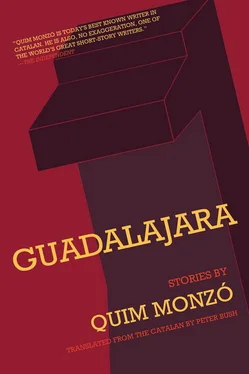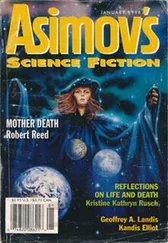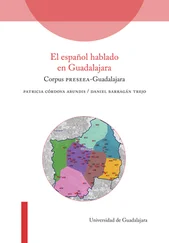Quim Monzó - Guadalajara
Здесь есть возможность читать онлайн «Quim Monzó - Guadalajara» весь текст электронной книги совершенно бесплатно (целиком полную версию без сокращений). В некоторых случаях можно слушать аудио, скачать через торрент в формате fb2 и присутствует краткое содержание. Год выпуска: 2011, Издательство: Open Letter, Жанр: Современная проза, на английском языке. Описание произведения, (предисловие) а так же отзывы посетителей доступны на портале библиотеки ЛибКат.
- Название:Guadalajara
- Автор:
- Издательство:Open Letter
- Жанр:
- Год:2011
- ISBN:нет данных
- Рейтинг книги:3 / 5. Голосов: 1
-
Избранное:Добавить в избранное
- Отзывы:
-
Ваша оценка:
- 60
- 1
- 2
- 3
- 4
- 5
Guadalajara: краткое содержание, описание и аннотация
Предлагаем к чтению аннотацию, описание, краткое содержание или предисловие (зависит от того, что написал сам автор книги «Guadalajara»). Если вы не нашли необходимую информацию о книге — напишите в комментариях, мы постараемся отыскать её.
Guadalajara — читать онлайн бесплатно полную книгу (весь текст) целиком
Ниже представлен текст книги, разбитый по страницам. Система сохранения места последней прочитанной страницы, позволяет с удобством читать онлайн бесплатно книгу «Guadalajara», без необходимости каждый раз заново искать на чём Вы остановились. Поставьте закладку, и сможете в любой момент перейти на страницу, на которой закончили чтение.
Интервал:
Закладка:
At midday, though summoned by nobody, simply moved by their civic instincts and anxiety, those citizens who were conscious of the situation started to head towards the square, wanting to find out what was really going on. According to some, the trigger had been a revolt (it was unclear whether it was military or civilian) in a distant province (it was unspecified and varied from mouth to mouth: it was this or that depending on the speaker), a revolt that had been seething for months. Its distance from the centers of power was one of the reasons why no untoward developments were in evidence in the capital (said those returning from there). According to others, in principle it involved a confrontation between two factions (that weren’t openly antagonistic) within the army, an army that in the past had won victories and accomplished feats that had become legendary and that, until very recently, had enjoyed a generous budget, though a degree of unease had been generated in the higher ranks that resulted from the economic restrictions they now faced, inactivity, and restrictions encouraged by the absence of bellicose conflicts of any significance, whether inside or outside the country. However, according to others, there had been a coup d’état in the capital (led by whom?), kept under wraps as much by its instigators (convinced that the most effective coup d’état was the least noticed) as by its victims, who considered that their best option, given that the coup leaders weren’t intending to glory in it, was to maintain a prudent silence, thus sparing themselves from having to admit defeat. So they acted as if nothing had happened, which meant they ensured that most of the population and diplomatic missions continued to be in the dark (or at least acted as if they were), to such an extent that if anyone decided to publicly insinuate that something was wrong, they would point to the calm on the streets to support their case. The coup’s leaders and the deposed leaders were then theoretically, and paradoxically, in accord. The fact that the pact of silence was supported equally on both sides meant that other people, who were even more devious, imagined that the coup’s leaders and the deposed leaders had planned everything down to the smallest detail, so the coup would go completely unnoticed. Given the silence, that seemed to have no apparent fissures, how could the engaged citizens properly evaluate the facts? The radio wasn’t broadcasting only classical music, as was usual in such circumstances, and the television continued with its planned schedule. At that very moment a film was coming to an end—part of the Elvis Presley cycle that had begun three weeks ago: Elvis Presley dives into the water, people applaud, Elvis swims to the cliff, climbs up, dries himself on a towel, and gets dressed. A crowd of men carries him on their shoulders back to the hotel. Everybody congratulates him; Ursula Andress says: “Bravo,” they kiss, are surrounded by a mariachi band, and Elvis breaks into song. Following the Elvis film, the program schedule continued as planned (this was particularly significant) and no reference was made to any conflict. Consequently, the engaged citizens found themselves deprived of the data that was necessary to evaluate the real situation; a lack of orientation that only increased their doubts and caused misgivings and rumors to spread like wildfire. Such a tenuous basis in fact precipitated a moment when people quickly flitted from one supposition to another, leading to a third that opened the way to a fourth, each as impossible to prove as any of the preceding ones yet accepted as readily as any accomplished fact. And had there been lots of casualties, as someone claimed? Was the situation changing drastically, as another reported? And, besides, was changing drastically in relation to which previous situation? The tensions between the engaged citizens heightened, fanned by their different perspectives and inability to prove a thing, which prevented them from reaching any decision, specific or not. In demonstrations in front of the military government building, the tension caused by this dearth of data would often seethe to a metaphorical boiling point, and the most incensed citizens had to be pulled apart from the most phlegmatic of the citizenry. There were those who even questioned whether it was necessary to take a decision. Why should they? Wasn’t it better to carry on as they were? (Obviously, with their ears to the ground. They could all agree on that.) The arguments became so acrimonious that at 2:00 p.m. it was finally decided to defer any decision till after lunch, so they could debate more calmly. Everyone went home, except for three citizens who always went out for lunch; they headed to a nearby restaurant. The situation was no less tense inside: whispering around every table, averted gazes, and dissimulation.
In mid-afternoon, troop movements were detected in front of the military government building. However, right away, those who question everything made their voices heard: Was there any indication, any particular sign of aggression in those movements? Could one deduce that something really serious was afoot, or were they simply routine drills? Barely accustomed to army maneuvers, the engaged citizens (who’d now lunched, met in the café, and made their leisurely way to the military government building) hadn’t a clue how to interpret them; they could all agree on that. A black car, with a black pennant, drove up at 4:32. An officer got out. From that distance, most of the engaged citizens, who’d been conscientious objectors, were unable to define his exact rank. Was he a general? A captain-general? A lieutenant-general? Or a mere lieutenant? Would it have given them a clue, had they known? It obviously wouldn’t have, and this made them even more irate—anger they directed at themselves on this occasion. They thought that the two sentries (doing their duty on either side of the main entrance, in concrete boxes with green-tiled domes) saluted him particularly respectfully, but people weren’t unanimous about that. Once the officer had entered the building, the car drove off. Did its immediate departure denote anything serious, or on the contrary, was it a positive sign? At 6:32, a demonstration of engineering workers in overalls walked up High Street and into the square. The demonstration had been called the previous week, complied with all the legal requirements, and was, thus, totally authorized. Once again, the rumor mill found fresh proof in the fact that none of the powers-that-be (whether civilian or military) had banned it: if it had been banned, it would have been a sign, an acknowledgement of the anomalous situation. They could agree on that. Consequently, they let the demonstration go ahead, and some 150 individuals (a hundred, according to the report filed by the municipal police) marched to the West Bridge, without hindrance: there they dispersed peacefully, heading home or to the nearest watering-holes. Suddenly, at 7:13, the same officer who had alighted from the car a few hours earlier came out of the military government building. However, he was now in the company of another officer of a different rank, but again those present couldn’t determine what his rank was due to the aforementioned gap in their knowledge. The car (the same one from earlier in the afternoon; a citizen with a fine memory had memorized the license plate number) was waiting for them.
It would be a tense night. The hours passed slowly. The engaged citizens twisted and turned sleeplessly in their beds. How could they sleep when they felt so anxious? Radio stations still weren’t broadcasting classical music and the television kept to its scheduled programs: a competition with couples who’d broken up and the next chapter in a television drama, which that night revealed that one of the characters was a homosexual.
Читать дальшеИнтервал:
Закладка:
Похожие книги на «Guadalajara»
Представляем Вашему вниманию похожие книги на «Guadalajara» списком для выбора. Мы отобрали схожую по названию и смыслу литературу в надежде предоставить читателям больше вариантов отыскать новые, интересные, ещё непрочитанные произведения.
Обсуждение, отзывы о книге «Guadalajara» и просто собственные мнения читателей. Оставьте ваши комментарии, напишите, что Вы думаете о произведении, его смысле или главных героях. Укажите что конкретно понравилось, а что нет, и почему Вы так считаете.












